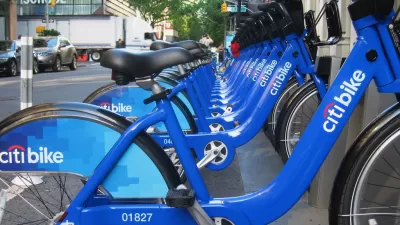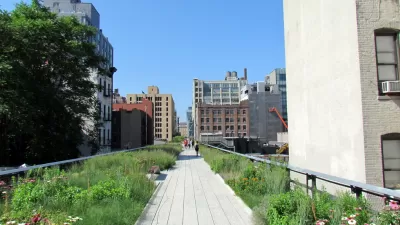Portland (top city in 2012)? Minneapolis (top city in 2010)? No, it's the Big Apple! New York City leaped from #7 in 2012 to the top spot this year for cities with populations of 100,000 or greater.

"Bicycling Editor-in-Chief Bill Strickland said today’s [Sept. 3] announcement is 'a surprise to many cycling insiders,' with New York’s recent track record as a role model for other American cities putting it over the top.," writes Stephen Miller of Streetsblog NYC.
“New York City is on the leading edge of how cities can use bicycles to improve the quality of life for everyone,” (Strickland) said. ”We think it’s going to influence cities not just around the country, but around the world.”
Credit goes largely to the former Bloomberg administration, particularly to former Transportation Commissioner Janette Sadik-Khan. "DOT added more than 366 miles of bike lanes, including 31 miles of protected bike paths [PDF], during the last seven years of the Bloomberg administration," adds Miller.
Indeed, protected bike lanes appeared to have scored particularly high this year, sending a message to all cities who wish to be viewed as "bicycle-friendly". The presence of bike share also appeared to be a major factor.
“As ‘Bicycling’ magazine notes," writes Pete Donohue of the Daily News, "New York has — against all odds — embraced, and has been transformed by, a mode of transportation which is inexpensive, burns no fuel, emits no carbon, helps tackle obesity, connects people to their communities and — let’s face it — brings joy,” said DOT Commissioner Polly Trottenberg.
Michael Andersen, Bike Portland's news editor, lists the rankings for 2014 and 2012, after noting, "It’s our lowest ranking in 20 years. Bicycling named Portland as the nation’s best bike city in 1999, 2001, 2006, 2008 and 2012."
1. New York
2. Chicago
3. Minneapolis
4. Portland
5. Washington
6. Boulder, Colo.
7. San Francisco
8. Seattle
9. Fort Collins, Colo.
10. Cambridge, Mass.
Here’s the previous Bicycling ranking, from 2012:
1. Portland
2. Minneapolis
3. Boulder, Colo.
4. Washington
5. Chicago
6. Madison
7. New York City
8. San Francisco
9. Eugene
10. Seattle
And America's "second city" also occupies that rank from Bicycling's perspective. "The magazine cited [Mayor Rahm] Emanuel’s plan to add 100 miles of protected bike lanes by 2015; the city’s $60 million Navy Pier flyover, which features an elevated bicycle-pedestrian path along the Lakefront Trail; and a “bike-share arms race with New York City," writes Rosalind Rossi, transportation reporter for the Chicago Sun-Times.
Steve Brandi of the (Minneapolis) StarTribune explains why his city dropped to #3 and why New York and Chicago jumped to #1 and #2 respectively.
It's been late to the parade on implementing protected bike lanes, the hottest new technique for trying to persuade people to ride instead of drive. New York and Chicago jumped to the top of the list after recently adding miles of such lanes -- in which something more substantial than painted lines separate bikes from drivers.
Correspondent's note: Sorry, I could not find a link to the Bicycling Magazine article at press time. Please feel free to add it under "Comments".
FULL STORY: Trottenberg: NYC Won’t Be Dethroned as America’s “Best Biking City”

Alabama: Trump Terminates Settlements for Black Communities Harmed By Raw Sewage
Trump deemed the landmark civil rights agreement “illegal DEI and environmental justice policy.”

Study: Maui’s Plan to Convert Vacation Rentals to Long-Term Housing Could Cause Nearly $1 Billion Economic Loss
The plan would reduce visitor accommodation by 25% resulting in 1,900 jobs lost.

Planetizen Federal Action Tracker
A weekly monitor of how Trump’s orders and actions are impacting planners and planning in America.

Wind Energy on the Rise Despite Federal Policy Reversal
The Trump administration is revoking federal support for renewable energy, but demand for new projects continues unabated.

Passengers Flock to Caltrain After Electrification
The new electric trains are running faster and more reliably, leading to strong ridership growth on the Bay Area rail system.

Texas Churches Rally Behind ‘Yes in God’s Back Yard’ Legislation
Religious leaders want the state to reduce zoning regulations to streamline leasing church-owned land to housing developers.
Urban Design for Planners 1: Software Tools
This six-course series explores essential urban design concepts using open source software and equips planners with the tools they need to participate fully in the urban design process.
Planning for Universal Design
Learn the tools for implementing Universal Design in planning regulations.
Caltrans
Smith Gee Studio
Institute for Housing and Urban Development Studies (IHS)
City of Grandview
Harvard GSD Executive Education
Toledo-Lucas County Plan Commissions
Salt Lake City
NYU Wagner Graduate School of Public Service



























